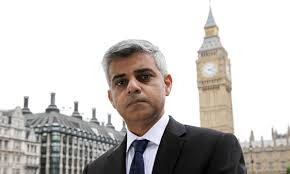This is a curious statement, and by no means the only one of its kind floating around these days, because it’s both true and untrue. Certainly, you have to respect the outcome of a vote in the sense that it sets the framework of politics. But there would be no Opposition if we simply respected, fully, the result of a vote: we’d have to say, “the people have voted for the other side so we should back their policies”.
In reality, we say “this is the way people voted but we’re going to keep up the pressure all the same. We believe people can change their minds and we want to win at the next election as we lost at this one”.
The Guardian article from which I took the Rayner quote was concerned with the statements of the Mayor of London, Sadiq Khan, that it would still be possible for Britain to remain in the European Union. This is coming to be known as an exit from Brexit. It would take another vote, he acknowledges, which is precisely what I would expect an Opposition to demand: beaten in one vote, it works for victory in the next.
 |
| Sadiq Khan, outside Westminster. Is that where his future lies? |
This is another of those curious statements, that’s both true and untrue. A small number of nations are members of the Single Market without being members of the EU. Norway is a notable example. But Corbyn is right in a wider sense: to retain its membership of the Single Market, Norway has in effect to behave like a member of the EU, accepting all its regulations and even paying contributions to its budget, but without having any say in setting them. One can imagine that opting for such an outcome for Britain might honour the strict letter of the Brexit vote, but entirely deny and undermine its spirit.
The problem is that it’s hard to be confident that Corbyn is taking this position merely to “respect the vote”. Given his past pronouncements, one has to suspect that he’s hiding behind the will of the people in order not to reveal that secretly he’s in sympathy with the Brexit camp – even though that’s contrary to the official position of the Labour Party he leads.
This would certainly be disingenuous at best. But far more serious, it means that on this crucial question for Britain, the government faces no Opposition. The biggest Party opposing the Tories will ultimately back the government – as has repeatedly happened on Brexit votes. Labour MPs put forward amendments, lose them and then line up under Leadership pressure to pass, docile and toothless, through the government lobbies on the substantial question.
As I said before, taken to extremes, “respecting the vote” means backing the government. On the EU, it feels as though that’s exactly what Labour is doing.
That’s why it’s so refreshing to hear Sadiq Khan speak out. At last, a leading member of the Party has spoken unequivocally in favour of Party policy. What a contrast with an official leadership which seems paralysed by its own ambivalence over it. Above all, Khan is speaking as a true Opposition leader: accepting that the people have delivered a verdict and that we are therefore heading in a direction we view as mistaken, but refusing to give up the right to work for a change in that decision even at the eleventh hour.
In other words, as an Opposition should, he holds out the hope of reversing a decision that went against us. That’s an approach I’d like to see the whole of the leadership embrace. My fear is that the present leadership may be unable to make such a change, and instead what we need is a change in leadership.
The Mayor of London, I feel, has given us a taste of what that might be.






